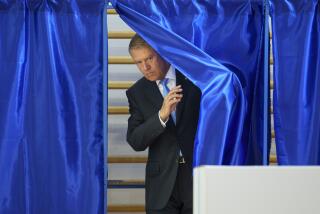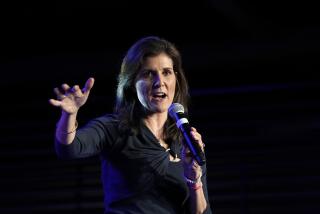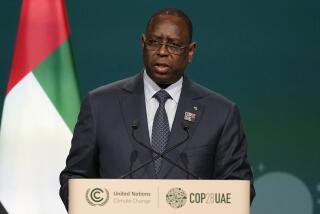U.N. Chief Suspends His Bid for Reelection
- Share via
UNITED NATIONS — Boutros Boutros-Ghali “suspended” his candidacy for reelection as United Nations secretary-general Wednesday, a move that diplomats here said clears the way for selection of a new U.N. leader more acceptable to the United States.
The U.N. Security Council, charged with nominating the secretary-general, is expected to begin considering alternative candidates Friday and could make a selection as early as Monday, council sources said. Priority will be given to candidates from Africa, and the names of three nominees from that continent already have been informally circulated among council members, the sources added.
Italian Ambassador Francesco Paolo Fulci, the council president for December, announced Wednesday that Boutros-Ghali “intends to suspend his candidature for the time being,” allowing the council to consider other nominees.
Boutros-Ghali told reporters Wednesday, “I’m still a candidate and still the only candidate for Africa.” He added that he was merely asking the Security Council “not to vote again on my name until I will present my name” again.
But other sources here characterized Boutros-Ghali’s announcement as a graceful way for him to bow out. Other candidates had been reluctant to come forward while Boutros-Ghali continued to actively seek reelection.
The United States, which invoked its rarely used Security Council veto power Nov. 19 to block Boutros-Ghali’s reelection, welcomed Wednesday’s announcement.
“It’s going to allow the names of other well-qualified African candidates to come forward and be considered by the Security Council,” White House spokesman David Johnson said in Washington.
Boutros-Ghali, 74, would be the first secretary-general denied a second five-year term. Although he won the backing of 14 of the 15 Security Council members Nov. 19, the U.S. was able to torpedo him single-handedly because it is one of five permanent council members given veto power by the U.N. Charter. U.S. Ambassador Madeleine Albright argued that Boutros-Ghali is not sufficiently committed to reforming the U.N. bureaucracy and that a new secretary-general is needed to overcome opposition to the organization within the Republican majority in Congress. Sen. Jesse Helms (R-N.C.) and others have criticized Boutros-Ghali over a number of issues, including the perceived failure of U.N. policy in Bosnia and Somalia and concerns that the U.N. is imposing on U.S. sovereignty. Congress has tied up payment of U.S. back dues to the U.N., estimated at $1.45 billion.
The U.S. has been isolated in part because it announced its opposition to Boutros-Ghali’s reelection in June without the advance agreement of its allies and because its decision was leaked to the media before other U.N. delegations had been informed.
The three names informally circulated Wednesday were U.N. Undersecretary-General Kofi Annan of Ghana, head of the organization’s peacekeeping arm; Ivory Coast Foreign Minister Amara Essy, who was president of the U.N. General Assembly in 1994-95; and former Niger Prime Minister Hamid Algabid, secretary-general of the Organization of the Islamic Conference.
The U.S. has declined to comment on any specific candidates.
Candidates also may emerge from a meeting of African leaders and French President Jacques Chirac underway in Ouagadougou, capital of the West African nation of Burkina Faso. The meeting is scheduled to conclude Friday.
France has been a stalwart backer of Boutros-Ghali and a harsh critic of the U.S. opposition, but it also is concerned that the next secretary-general be fluent in French, which along with English is an official language of the U.N. Although the French officially deny it, some here believe they are working behind the scenes to make sure that the next secretary-general comes from a French-speaking African nation.
Council members have suggested that if African representatives do not begin submitting other names to Fulci for council consideration within the next few days, candidates from other regions, principally Asia, will be considered. Africa’s U.N. ambassadors are expected to meet this morning on the issue.
Council members indicated they would prefer to move quickly.
More to Read
Sign up for Essential California
The most important California stories and recommendations in your inbox every morning.
You may occasionally receive promotional content from the Los Angeles Times.










